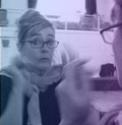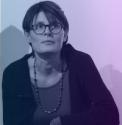Sandra Morán: Knowing & Recognizing & Protecting Each Other!
Sandra Morán: Knowing & Recognizing & Protecting Each Other!
The long-term activist and former musician is the first openly declared lesbian in the Congress of Guatemala.
The Conference titled FEMINIST IS THE COLOUR OF THE NEW CLASS STRUGGLE, was held in October 2018 in the organization of the Rosa Luxemburg Stiftung, and it gathered many women from around the world. When I met Sandra at the lecture We Want Ourselves Alive! – Fighting Violence Against Women!, I knew right away her voice should be heard within our feminist philanthropy programme, since Reconstruction Women`s Fund has been spreading the voices of women who inspire and motivate us, finding it important to know what has been going on across the globe concerning women`s rights, struggles and resistances!
Sandra Morán from Guatemala is well known for her support of feminist issues, LGBT*IQ, women’s and indigenous rights. She is the first openly declared lesbian in the Congress of Guatemala, of which she is a part from 2015. In 1995, after returning from exile, she organized the first active lesbian group in Guatemala. The long-term activist and former musician assumes an important role in both politics and activism, since her approach is to position the agendas of feminist movements in Congress.
Why was it important to organize women`s gatherings?
It`s always important that we can gather as women, because it is a powerful tool for us to meet, to share experience, to learn from each other and to find the way to be together.
Do you think it is important to invest money in women`s human rights?
Of course, because we women still cannot enjoy the rights that we have. Some women don`t know the rights that they have. And to do that we need some resources, need to talk about it and also to talk to different women who don`t usually come to these gatherings or meetings, and also to do campaigns that can reach other women, and these campaigns need to be in their own languages – in some countries they have different languages and some women speak their language that is not the main language – and all of that requires resources.
Do you know about some feminist foundations?
Well, right now there are less and less feminist foundations. Some wealthy women are doing it, but there are less and less resources for women.
You come from Guatemala. What is the situation there concerning women`s rights, and particularly, you are in the parliament, so how does your fight go when it comes to women there?
Right now the government is using the line of family values and the line of avoiding the influence of gender ideology – they are using it against us, women, so it is very hard for us in the Congress to present and approve laws for women and also for indigenous people, as well as for the social programs. Even though we have women`s policy in the government and in the state, this women`s policy does not have a lot of resources or the ministries use the money for women for other uses… We are now in the situation where the majority of people are in poverty or extreme poverty, and the majority of those people are women. We are also affected by migrations. Then there are families where women are in charge of everything, and we have no welfare program in our country, so if you don`t work, you don`t have money. There are more and more people in the streets begging for money, and many of them are women or children. We are also affected by trafficking. That is very hard, especially for children and youth. Also we have the problem of sexual violence against women a lot, and against children and youth, adolescents. So the situation is not very good, although there is a movement – we are fighting, continuing our struggle, also building the ideas of a new system, there is this emancipating wave that is very good and we need to continue with it, because that is the future. And indigenous people are getting back their strength and that is also the future… but for now the situation is very difficult.
What is going on with protection of women`s and particularly human rights of girls?
I presented a law, with women`s and children organizations, also organizations of LGBT people, that has dealt with the problem of children getting pregnant, children from eight to fourteen years old, children who don`t have the support in their families because their family members are the ones who raped them. Then they don`t have support of their families, sometimes also don`t have the support of their community. The state did not prevent that or did not have the strength to prevent that, so we believe it has to support them. The churches managed to call the attention to that law they called “the abortion law” and 93% of population in Guatemala is against abortion. Because of that, they dismissed the law and then we have thousands of children left without any support. And right now we are pushing this issue again, explaining why we are doing it, asking what the churches are doing, where are all these people who are against this law, what are they doing… we need to do something, since it is a big problem, do you want them to maintain the forced pregnancy and force them to maternity – all right, but why? Those people are very poor and you force a poor child to have a child. What is the future for them? That`s the question we are putting forward and it is very sad, and we are very angry and we will continue to deal with the issue.
What does the solidarity mean to you?
Solidarity is a relationship between people, a way of being together in the struggle for changes, for the future, a way of knowing and recognizing each other, our strengths, but also protecting each other. We had the experience of a lot of solidarity in Guatemala – from different countries and this solidarity saved thousands of lives when we were in war and in refugee status… So we know what solidarity is and how the relations that start from the solidarity movement are very big, tight and finally we become like family, extended family. I believe we need solidarity, all of us – from all of us.
Thanks.
Interview: Zoe Gudović
Transcription:Ana Imširović Đorđević






